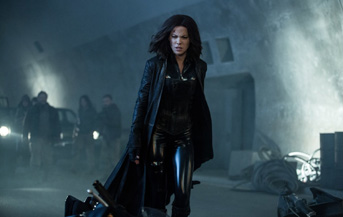Movie Review - Underworld: Blood Wars
By Ben Gruchow
January 10, 2017
BoxOfficeProphets.com

Classism and genealogy are at the root of this franchise’s continuation; what I imagine elevates the intrigue among the devotees of the series is the exploration of arcane backstory and vaguely-recognizable mythologies, dressed up in pseudo-Gothic, conspicuously underlit (and usually rainy) surroundings. This implication of world-building is a pretext, or maybe just an excuse, to conduct action scenes with lots of gunfire and acrobatics and bloodshed between the two warring factions: vampire “Death Dealers” led by Selene (Kate Beckinsale), and werewolf “Lycans” led by…well, by a revolving door of special guest stars, I guess. Similarly to the Vampire Nation in the like-minded (and superior) Blade series, the bureaucracy seems to change with each film.
No explanation for the turnover at headquarters is given by Underworld: Blood Wars, and senescence has taken all but the faintest bitter memories of indiscriminate DI and blurry CG in the first three films, so I can only assume it's due to ruinous incompetence on the part of the senior staff or inadequate vetting of the junior staff. Consider their engineering of strongholds. The Lycans are mounting an army for an offensive against the movie’s coven of vampires, we’re told early on. “It will be their downfall!” claims the head of the vampire council (he has a name, but let's not kid ourselves: these movies are stuffed to their icy contact lenses with councils and covens and tribes and tribunals and heads of things, and their names are all beside the point).
“Nobody has mounted a successful attack on this fortress! We are too strong!” Never mind that roughly 20 minutes later we see a single car successfully barrel through the fortress’s outer gate, and you might not be surprised to learn that, in a movie subtitled Blood Wars, a successful attack against the fortress is very much indeed mounted. Perhaps it's less engineering and more a general failure to comprehend the enemy: a vaguely Nordic coven to the north has never been attacked by Lycans, we are told. Too far out of the way, and far too cold. Almost no sooner have these words been spoken than an army of Lycans pops up on the horizon, ready for a blood war. Not cold enough.
Consider the motives of Semira, played by Lara Pulver, as an elder council-vampire, ambitious to the misfortune of anyone in her path. She wants the coven to recruit Selene to train their crowd of young and green Death Dealers. Certainly she has the knowledge expertise, having shot and hacked her way through four movies’ worth of Lycans. All of the coven’s resources will be at her disposal, she is told after she is recruited. What are the young Dealers given, then, during the film’s single preparatory course? Standard training-montage orders, with a lupine coat. “Don't shoot at the Lycans – anticipate!” Selene commands. “A Lycan is never weaker than in wolf form; there is only bloodlust!” I paraphrase slightly, because I do not remember the exact wording and life is too short to attempt verbatim quotes of movies about warring supernatural creatures that really should set aside their weapons long enough to improve their fortifications and training technology.
There is never a moment when the vampires aren't clad in multiple layers of leather or vinyl or both. Selene is hiding away with the Nordic coven, among spiritual caves and pools and consorting with vampires that seem to possess nothing but light shifts and robes, and yet her base layer of clothing still appears to be the skintight catsuit she's been garbed in for five films. Vampires may not sweat or feel temperature changes, but this would not stop wrinkling and sagging after a thousand years of wearing the same outfit. What does she wear on laundry day? I yearn for an Underworld featuring Selene Lycan-hunting in yoga pants and a sweatshirt because the suit has to be tumble-dried.
These things would be irrelevant to the experience were the movie cheerfully junky and pulpy, but no. Everything in this series is approached with the utmost gravitas, humorlessly grim, as if the filmmakers were producing a sobering historical adaptation, or a DCEU film. The Blade series lost its way by tilting too far toward snarky self-awareness; this is what it's like to see the opposite approach. We alternate between hectically-cut scenes of shaky-cam kineticism, the likes of which we've seen dozens or hundreds of times before, to scenes of ponderous expository dialogue, the likes of which we've also seen dozens or hundreds of times before. The accelerated narrative gives short shrift to all but the core two or three players; Theo James and Charles Dance make guest appearances, but their final scenes play like the editors made one cut too many in the name of brevity.
It is not actively unpleasant to sit through, and it is cleanly told as an accelerated narrative; director Anna Foerster (the first woman to helm a minor hit series about a strong female protagonist) does not do anything new with the aesthetic, but the general shape of the story’s conflict and incident proceeds in a clear-eyed arc that's beyond anything the oppressively fussy first few entries were able to offer up. And the movie benefits from low expectations, which is a perk you get when you open your film on the first weekend in January. We are perhaps more forgiving toward junk cinema when it announces itself plainly. We are even more forgiving toward junk cinema when it’s enjoyable.